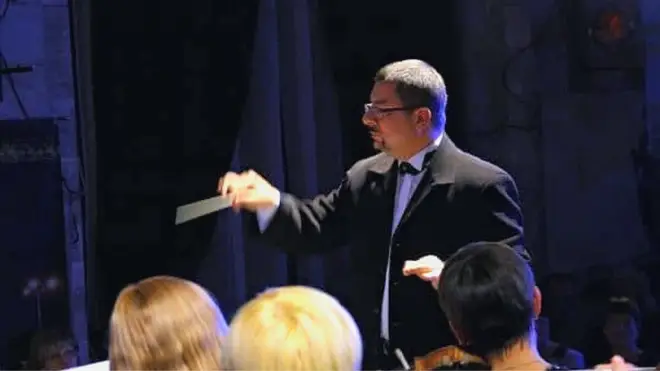Ukrainian conductor shot and killed by Russian troops for refusing to participate in concert
17 October 2022, 15:15

The Ukrainian musician was the conductor of the top orchestras in Kherson, a port city which has been occupied by invading Russian forces since March of this year.
Listen to this article
Ukrainian conductor, Yuriy Kerpatenko, was shot and killed in his home by Russian forces, according to the Ukrainian Ministry of Culture.
The 46-year-old musician was the conductor of the Mykola Kulish Kherson Music and Drama Theater, the Kherson Regional Philharmonic, and the Gileya Chamber Orchestra.
Kherson is a port city in Ukraine, and was the first to fall to Russian troops at the beginning of the war. The southern city has been occupied by Russian forces since 2nd March 2022. By May, it was estimated that 45% of the local inhabitants had fled the city.
Kerpatenko was one of the city’s residents who refused to leave. From February to May 2022, the conductor posted public messages on his Facebook profile, speaking out against the Russian invasion.
The Ukrainian Ministry of Culture said that Kerpatenko was killed because he refused to play in a concert that was organised by Kherson’s occupiers.
Read more: Powerful footage shows opera singer leading Ukrainian national anthem under Kyiv station
Yurii Kerpatenko, principal conductor of Kherson Music & Drama Theater, was shot by R🇷🇺 troops, - 🇺🇦 Culture & Information Policy Ministry.
— Anton Gerashchenko (@Gerashchenko_en) October 15, 2022
Russians planned concert in Kherson to show how normal life there is. Yurii refused to participate & was murdered.
RIP, true Ukrainian. pic.twitter.com/rvAcYQ78Cn
Kherson’s occupiers were reportedly planning a concert for 1 October 2022 (the International Day of Music). The Ukrainian Ministry of Culture said this event was organised to showcase a Russian-described “improvement of peaceful life” in the region.
The Gileya Chamber Orchestra – a chamber offset of the Kherson Regional Philharmonic – were pinned to perform at this occupier-organised concert, and as Kerpatenko was their main conductor, he was reportedly asked to conduct.
According to the Ukrainian Ministry of Culture, Kerpatenko refused to perform in the concert, and his noncompliance is what reportedly led to his death.
The news of Kerpatenko’s death was broken by Ukrainian journalist, Olena Vanina, last Thursday. According to Vanina, Kerpatenko was shot and killed in his home at an unknown date.
According to Vanina and subsequent outlets, Kerpatenko’s friends and family last received contact from the musician in September.
Vanina’s post included the line, “I would like all [of] Ukraine to know about [Kerpatenko’s death]. [He] was a very talented conductor and especially, arranger.”
Read more: Musicians of Ukrainian orchestra mourn their pianist, killed in the battle for Mariupol

Chamber Orchestra "Gileya" of Kherson Philharmonica - Маленька Нічна Серенада. (В. А. Моцарт)
The classical music world, and beyond, was quick to respond to the reported news of Kerpatenko’s death.
Ukrainian-born Finnish conductor, Dalia Stasevska, shared her shock on Twitter over the weekend upon hearing the news.
“No words. Hearing your colleagues being killed.” Stasevska wrote, “An eternal memory to Yuriy Kerpatenko.
“Let our fight for human rights, against dictatorships and free Ukraine and world be even stronger.”
Read more: Royal College of Music suspends professor who played piano amid Russian ‘war crime’ remains
Russians shot a conductor for refusing to perform at a concert in Kherson.I know I wouldnt be that brave and that's why Ukraine will win.I put his name on my keyboard, with the help of my friend @dariahlazatova we will do something for his family, Yuriy Kerpatenko 📷 @aronlaw pic.twitter.com/Z8qNKvaTI9
— Roger O'Donnell (@RogerODonnellX) October 17, 2022
Roger O'Donnell, the keyboardist for the English Rock band, The Cure, tweeted on Sunday night that he would be, dedicating his performance that evening to Kerpatenko.
On Monday morning, he shared a picture from the previous night’s concert, which showed his keyboard adorned with the Ukrainian conductor’s name.
The Georgian President, Salome Zourabichvili, also took to Twitter to draw a musical comparison.
“[In] 1937”, Zourabichvili wrote, “Soviet occupants killed Evgeni Mikeladze of the Georgia Philharmonic Orchestra”.
The Georgian conductor was executed during ‘The Great Purge’ in 1937; a campaign led by Soviet General Secretary Joseph Stalin, to solidify his power over the party and the state.
Zourabichvili compared the Georgian conductor’s execution to Kerpatenko’s shooting, 85 years later. She said that both deaths had at the heart of them the “same intolerable policy of invasion, occupation and use of culture as a weapon of terror.”
Kherson’s regional prosecutor’s office have launched a formal investigation, initiated on the basis of “violations of the laws and customs of war, combined with intentional murder”.


































